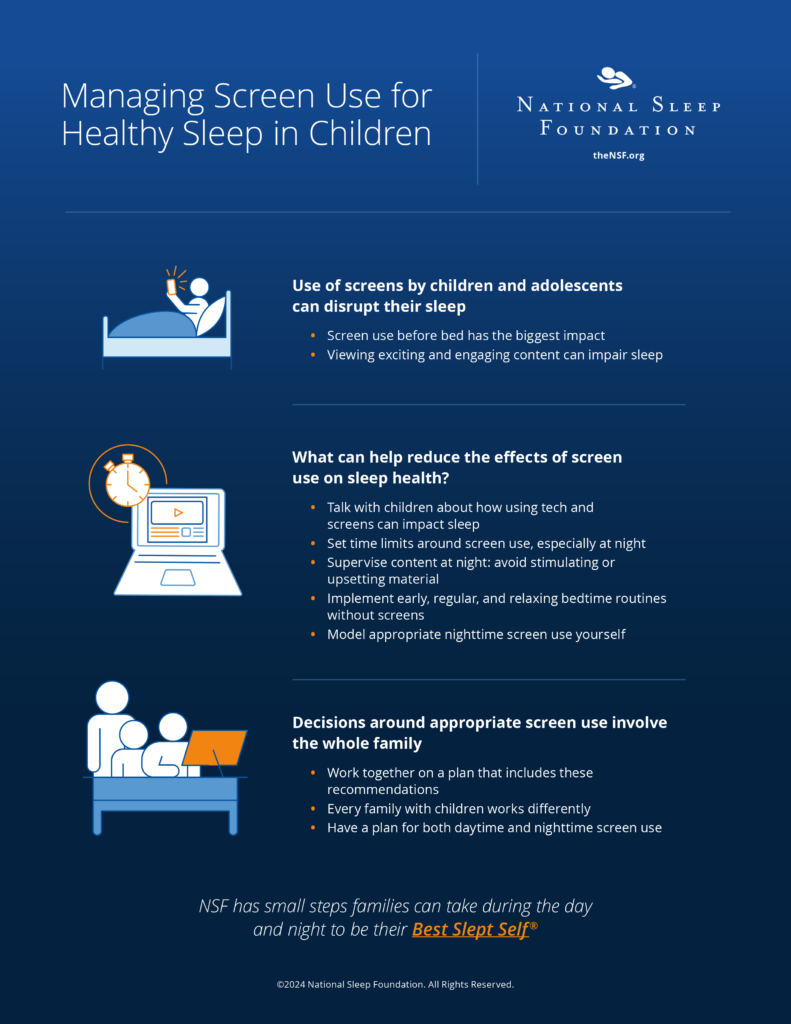Effects of Screen Use on Children’s Sleep
Media contact:
Stephanie Kohn
540-850-7827
skohn@thensf.org
National Sleep Foundation Highlights the Effects of Screen Use on Children’s Sleep
Behavioral strategies and interventions may reduce the negative effects of screen use on sleep health
Washington, D.C. (May 29, 2024): The National Sleep Foundation (NSF) sounded a call for appropriate use of screens based on current evidence of their effect on sleep health in children and teens. The updated response follows a consensus report published in Sleep Health®, the Journal of the National Sleep Foundation, under the original title The Impact of Screen Use on Sleep Health Across the Lifespan: A National Sleep Foundation Consensus Statement.
The NSF advances the public’s knowledge, behaviors, and practices by issuing guidelines and recommendations for sleep health. NSF established a multidisciplinary expert panel of 16 internationally recognized researchers to develop a consensus recommendation for screen use and sleep health, reflecting an extensive analysis of 574 peer-reviewed manuscripts on the subject.
The expert panel found that, in general, screen use impairs sleep health for both children and adolescents. In particular, the content of screen use before bed can have a negative effect on sleep. Finally, the expert panel affirmed behavioral strategies and interventions can reduce the potentially negative effects of screen use on sleep health.
“NSF is dedicated to improving sleep health for the public. Understanding what can negatively affect sleep health in youth and how to promote sleep health can set children and teenagers up for positive sleep health that can carry into adulthood,” said Temitayo Oyegbile-Chidi, MD, PhD, Chair of NSF’s Board of Directors.
“The expert panel examined available scientific evidence, paying close attention to studies that examined whether, how, and for whom screen use might negatively impact sleep health. We found that stimulating content of screen use, particularly at night, has a negative effect on sleep health in young people,” said NSF Vice President of Research and Scientific Affairs, Joseph Dzierzewski, PhD.
Screen use in youth is widespread. Best practices to reduce the impact of screens on sleep include:
- Talking with children about how using tech and screens can impact sleep
- Setting time limits around screen use, especially at night
- Supervising content at night: avoid stimulating or upsetting material
- Implementing early, regular, and relaxing bedtime routines without screens
- Modeling appropriate nighttime screen use yourself
NSF encourages parents and caregivers to make decisions about children’s screen use that work best for their family dynamic. Determining what constitutes appropriate screen use should be based on family-specific information. Generally, incorporating small changes into your family’s routine during the day and night can help everyone get the sleep they need to be their Best Slept Self®.
Not getting enough sleep, having poor sleep quality, or having inconsistent sleep schedules is associated with adverse health outcomes. For more information about sleep health, visit theNSF.org/sleep-health-topics.
Learn more about screen use and ways to improve children’s sleep health.
Download Screen Use Infographic
About the National Sleep Foundation
The National Sleep Foundation (NSF) is a 501(c)3 independent nonprofit corporation dedicated to improving health and well- being through sleep education and advocacy. Founded in 1990, the NSF is committed to advancing excellence in sleep health theory, research and practice. theNSF.org

